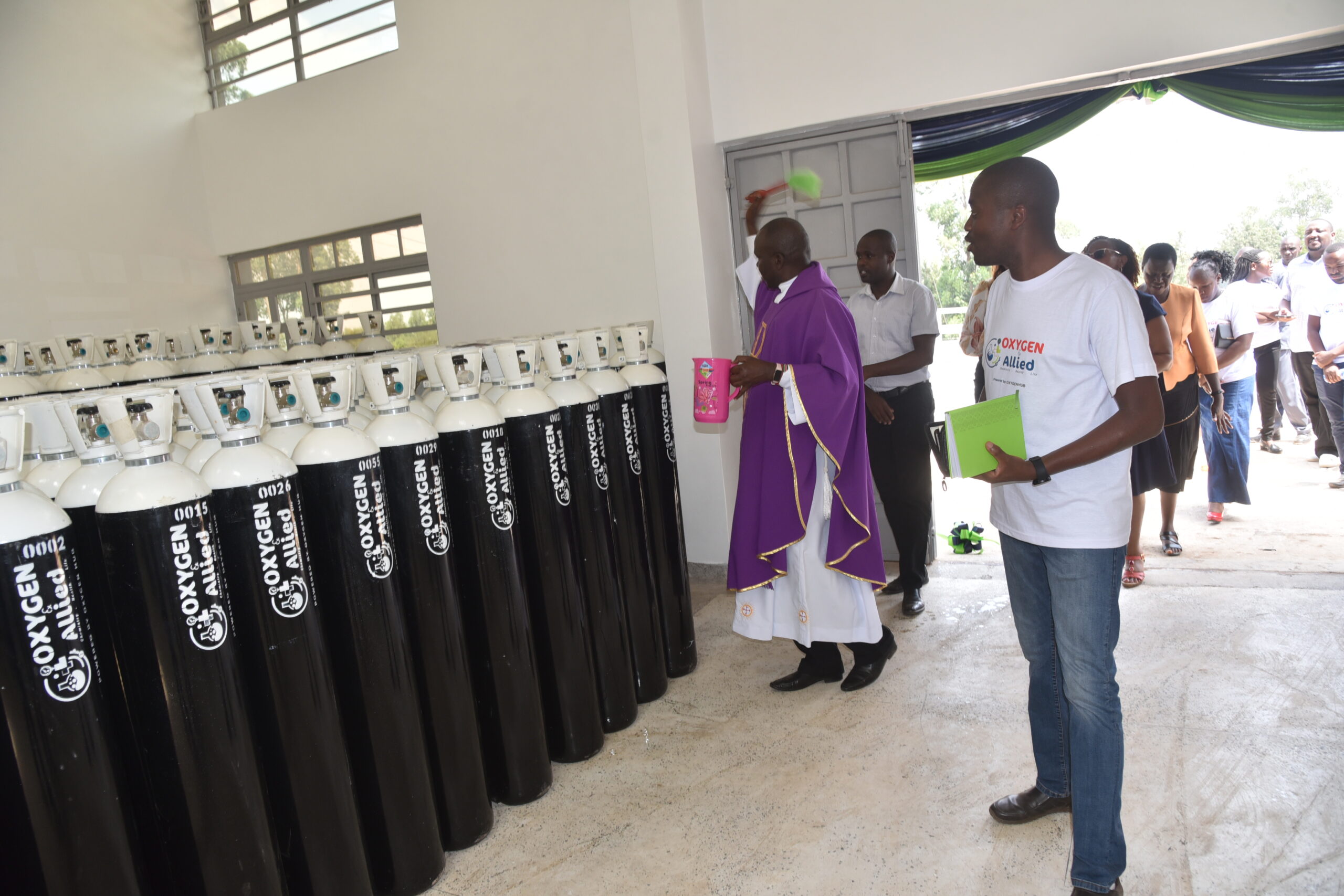By Shaban Makokha, Kakamega
As Covid-19 cases surged across the world in 2021, many people had no choice but to stand in line for hours in hospitals even as they or their loved ones struggled to breathe.
They were not lining up for masks, tests, or sanitisers but they needed oxygen – a lifesaving resource that was impossible to find, as it ran low in hospitals, selling out in stores, and prices gouged.
Medical oxygen is a last line of defense against Covid-19, a virus that attacks the respiratory system and for tens of thousands of Kenyans, it was not there.
Although Covid-19 cases have since fallen, oxygen remains an essential but limited resource, where new variants and respiratory diseases such as tuberculosis and pneumonia remain ever-present threats.
To tackle the oxygen gap in Western region, one family has come up as a partner in healthcare services to provide oxygen across the Western region and the country at large by bringing oxygen as an initiative to accelerate access to safe, reliable oxygen in five counties of Kakamega, Bungoma, Busia, Vihiga and Trans Nzoia.
Dr Mark Makomere, the Chief Executive Officer (CEO) of Oxygen & Allied Company said the initiative came up after he lost his mother-in-law in 2021 who had stayed in the ICU due to the then ravaging effects of Covid-19 for two weeks.
“She required at least six cylinders of oxygen daily. It was difficult to access oxygen and we would have to travel to Eldoret for the commodity. This was expensive and time wasting. This initiative is really personal for us because we have walked this journey – we lost our beloved mother due to lack of oxygen supply and I promised to save other lives that require oxygen supply,” said Dr Makomere.
Oxygen is critical for patients with hypoxia low oxygen levels in the blood, which can be caused by a multitude of conditions from tuberculosis to heart failure to new-born prematurity, but Covid-19 is especially demanding on oxygen supply, with the most severely ill patients requiring over 1,000 litres of oxygen per hour.
In Kenya, as in many low and middle-income countries before and during Covid-19, there wasn’t enough oxygen to meet the demand.
In Kakamega for example, the county government procured a new oxygen plant from France to help address the biting shortage in the face of the spike of Covid-19 cases but the 1,000 litres of oxygen per minute plant would be held at the Port of Mombasa for a month due to tax disputes with the Kenya Revenue Authority who demanded Sh8 million before clearing the Sh100 million medical oxygen equipment in the middle of a devastating pandemic.
Kakamega had a 10-bed ICU for Covid-19 patients who were coming in with most of them on very low levels that needed high-flow oxygen supply.
Mr Martin Nandwa, a biomedical engineer at the ICU unit said the county was faced with an oxygen supply hitch that forced them to procure the medical oxygen from Hewa Tele in Siaya County.
“We ended up sourcing the medical oxygen from outside because of the big number of patients who got admitted in our County General Hospital ICU unit,” he said.
Oxygen supply in public and private hospitals within the county were in disrepair or lacked qualified technicians to run. This left patients and families to scramble to find oxygen anywhere they could.
For example, in November 2020, former Matungu MP Justus Murunga who collapsed at his home in Makunda village died on arrival at the St Mary’s Mission Hospital over lack of oxygen machines to support him at the Matungu sub-county hospital where he was rushed in the first place.
The Sh95 million Oxygen & Allied Company plant standing at Kefinco Estate in Kakamega town is expected to help patients access the lifesaving resource without occupying an ICU bed.
Ms Faith Makomere, a director at the Oxygen & Allied Company said their intention is to ensure that nobody dies due to lack of quality oxygen.
“For us to produce oxygen and give it at a cost that is affordable, we remain grateful to God and pray that this assists someone’s mother, father, son or daughter in this journey of life because we understand this pain. Oxygen will typically be sourced in oxygen pressurised cylinders that need to be refilled, or oxygen concentrators (portable devices that the patient can have at their bedside or take home),” pointed out Ms Makomere.

The initiative focuses on strengthening oxygen systems in the five counties of Kakamega, Bungoma, Busia, Vihiga and Trans Nzoia where the need is great.
Along with each installation of the oxygen plant, Oxygen & Allied provides other logistical solutions in healthcare.
“We want to expand our services across the Western region and beyond as we train more biomedical engineers and technicians on how to use and maintain the equipment so that we prevent hospitals, particularly, from overcrowding with patients who require oxygen,” said Ms Makomere.
“This will save the lives of thousands of people who continue to suffer the consequences of the coronavirus and other respiratory diseases,” she added.
The plant has the capacity to produce 850 oxygen cylinders per day, strengthening the response not only to COVID-19 but to other respiratory diseases, such as pneumonia and tuberculosis.
“We have a workforce of 10 people who will directly be hired since the machine is semi-automated but it will offer opportunities alongside other services of delivery, maintenance, ICT, Human Resource among others. It will also push private hospitals to employ people to administer and maintain oxygen supply. All those who require oxygen will be able to access it from hospitalisation or from home oxygen therapy services,” she said.
Dr Dennis Miskellah, the deputy secretary general of Kenya Medical and Dentists, Pharmaceutical Union (KMDPU) said the public-private partnership was the best way in strengthening and scaling Covid-19 response in the country.
According to Dr Miskellah, almost half of healthcare services in the country are delivered through private sector providers which are often underused in national public health responses.
He called for the public–private cooperation approach in the provision of essential services in relation to healthcare, energy, water, and emergency services to mitigate the spread of Covid-19 whose trends are emerging differently.
“Governments both the national and the counties failed in the supply of oxygen due to big appetite in the procurement process. We hope they won’t frustrate private entrepreneurs who are coming up with such initiatives to save lives,” said Dr Miskellah.
Ends…




